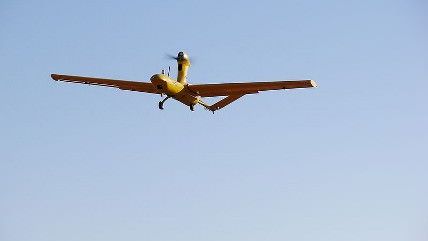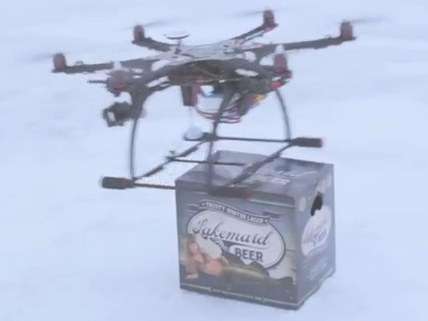Hey FAA, Let the Drones Go Free!
Given the technology's increasing proliferation, learning from mistakes and addressing real harms is not just the best thing the FAA can do, it may be its only option.


On 60 Minutes last week, Morley Safer, 82, interviewed Sen. Dianne Feinstein (D-Calif.), 80, about what's to be done about these new flying contraptions known as drones.
Feinstein said she had first-hand experience with the things, recalling the time Code Pink flew a drone around her house.
"I'm in my home and there's a demonstration out front, and I go to peek out the window and there's a drone facing me," she said. "Well, whoever was running it turned it around quickly and it crashed."
By all accounts, the "drone" Feinstein saw was a Lady Sky Invaders Pink Patrol RC helicopter available at your local toy store for $17.95. Still, it makes a good anecdote to tell when you're calling for the regulation of commercial drones—the kind used by film-makers, journalists, and real estate agents to get inexpensive, high-quality aerial photography.
According to Feinstein, we need regulation before drones are allowed to take to American skies. She says that what regulators must consider is, "When is a drone picture a benefit to society?"
And there's the rub. For many, it is entrepreneurs who must first demonstrate that new technologies are beneficial to society before they are allowed to use them. It's an inversion of a basic tenet of liberty that has served common law countries well: everything which is not forbidden is allowed. It is regulators who should prove that a technology causes real harm before restricting its use.
Feinstein is concerned about the potential effect of drone technology on privacy, and argues that we may need "some specific regulation on the kinds of uses it can be put to." But peeping tom laws already make it illegal to invade someone's privacy, whether you use a drone or not.
Others, like the FAA, are concerned about safety, and have tried to ban the commercial use of drones without special permission from the agency. Last month, it told a Detroit flower shop to cease and desist from its plans to make Valentine's Day deliveries via drone. Weeks before that it put the kibosh on Lakemaid Beer's plan to use drones to deliver 12 packs from its brewery to ice fishers camping out on Minnesota's frozen lakes. And just last week, the FAA told the Washington Nationals to quit using drones to film its players.
Of course, someone like Sen. Feinstein might ask, what's the benefit to society of beer or flower delivery? It's the wrong question to ask, but the answer is experimentation and the innovation that flows from it. By trying to take commercial use of drones off the table, the FAA is seriously hampering American ingenuity in order to guard against largely theoretical privacy and safety harms—and that has real consequences.
According to an AP investigation, while the U.S. has traditionally dominated the aviation industry, it is beginning to lag globally because it is not embracing the next stage in flight's evolution. In Japan, Australia, the UK, and UAE, drones are being used by commercial enterprises for everything from deliveries, to crop dusting, and energy plant inspections. Seeing the writing on the wall, Congress in 2010 passed a law ordering the FAA to issue rules making drones legal for commercial use by 2015. Yet the agency says it won't meet the deadline.
Luckily, it might not have to.
For one thing, a federal administrative law judge just ruled that the FAA's ban on commercial use of drones had never been enacted through the required notice-and-comment process, and he threw out a fine the agency had assessed against a prolific aerial photographer. The FAA is appealing, but there's a very good chance it won't prevail.
Another challenge the FAA faces has nothing to do with the law: How do you enforce a prescriptive rule on what will soon be thousands of small drone operators? Indeed, it may be the agency already recognizes the practical limits to its powers and that is why it quickly cracks down on any commercial drone use that challenges its authority. It likely knows that if just a few uses go unwarned or unpunished, the levee might break, and then the fact that the technology has changed what laws can be enforced will be laid bare.
Rather than fight against the tide, the FAA should see its recent legal setback as an opportunity. After all, it's under a congressional mandate to normalize commercial drone use. If it loses its appeal, what's it going to do? Begin a process to ban commercial drone use before it has to legalize it again?
Instead of insisting on a policy that requires permission before small drones can fly commercially—permission the FAA has only granted once—the agency should recognize that drones can be put to for-profit use legally and unleash a wave of permissionless innovation.
Bad things will no doubt happen along the way, but we will learn from mistakes and accidents. Given the technology's increasing proliferation, learning from mistakes and addressing real harms is not just the best thing the FAA can do, it may be its only option.
Editor's Note: As of February 29, 2024, commenting privileges on reason.com posts are limited to Reason Plus subscribers. Past commenters are grandfathered in for a temporary period. Subscribe here to preserve your ability to comment. Your Reason Plus subscription also gives you an ad-free version of reason.com, along with full access to the digital edition and archives of Reason magazine. We request that comments be civil and on-topic. We do not moderate or assume any responsibility for comments, which are owned by the readers who post them. Comments do not represent the views of reason.com or Reason Foundation. We reserve the right to delete any comment and ban commenters for any reason at any time. Comments may only be edited within 5 minutes of posting. Report abuses.
Please to post comments


In all fairness to the FAA, there are issues with drones sharing the skies with low-flying craft. I doubt that Feinstein gives a shit, but as someone who has spent a fair amount of time in a helicopter, I'm not exactly thrilled about small drones being in the flight path.
Case in point, my father has come within a hundred yards of getting hit by a developmental NASA drone in his R44.
Have you been on the R66 yet? I live 5 miles from the Robison factory, but have yet to receive and invitation...
Nah, I flew co-pilot with my dad for a while but I didn't get a rotary ticket. Flew fixed wing years ago. He's pretty much retired from flying at this point.
I'm in the process right now. It ain't cheap.
Nope. Three kids and a mortgage is keeping me away from it. I'll have to substitute one of these for the time being.
Have you auto-rotated yet?
I can't tell if I need that, or if I just want it.
I just got my medical cert, and am in the process of picking out a school. I can't decide if it's worth it to learn on a turbine now, or just do the R22 and upgrade later.
Do the R22. If you can fly a light, non-turbine chopper like the R22, everything else will be easy by comparison. Besides which, the R22 is a great little machine.
Just remember, negative G's are bad.
Helicopters don't need paperwork to physically fly.
Ban helicopters.
I've got an idea. Let's let eleven year-old kids with remote controlled motorcycles drive them on the interstate.
Let's privatize the interstate first.
First, Dianne Feinstein needs to demonstrate she is a benefit to society. Once that is clearly shown, we'll listen to her facist blather.
That is an interesting idea, Bardas.
I'll bet *very* few people could do that.
I mean -- demonstrate they themselves are a benefit.
Prior restraint is bad. The real answer is to let the next of kin battle it out in the court room.
It's an inversion of a basic tenet of liberty that has served common law countries well: everything which is not forbidden is allowed.
Pish. We all know in Third Millenium America, freedom means asking permission and following orders.
"It's a free country" has been replaced with "Who said you could do that?"
"You need a permit"
Breaking:
Dave Brockie, GWAR's Oderus Urungus, Dies At 50
Drones will, by all accounts, be a big deal and a lucrative industry in the not distant future. OF COURSE the pols want to wet their beaks: drone regulations = Lobbyists = money in the bank.
I don't think that little drone carried a 12 pack of beer.
That's an empty box.
Drones with spinning rotors are a liability lawyer wet dream. Think of all the fingers to be lost, the eyes gouged out.
How about simple property rights:
There is an envelope of restricted airspace about all private real property, in which no aircraft of any kind may deliberately enter unless the operator has permission from the property owner. The only real issue is coming up with navigational rules for drones operated within the "public"/common airspace that conventional aircraft fly in.
The FAA framework and dictating equipment requirements has stifled innovation in these areas.
There is absolutely no reason, given today's technology, that you can't cheaply bring all these airspace users up on one net and have a computer deconflict them.
I know, I know, what about the air traffic controller jerbs?
All the VFR pilots will be interested to hear that.
You could let VFR do their thing within established restrictions, and IFR operations can come up with some way to track all air traffic so they don't crash. That could easily be privatized.
Are you saying a VFR pilot couldn't have such a system installed and the drones avoid him?
Delivery drones will likely stay below 500' anyway.
The drones of the small quadcopter kind are more like hovering RC cars than "aircaft" that carry passengers or considerable payloads at high altitudes over long distances. Kept within private property or over public right of ways under a certain altitude, they are no more of the FAA's business than a kite is. Drones are a step towards the hovercars we've been waiting for, at least for transporting small amounts of goods around towns just over the surface traffic.
People should own their own airspace, at least within a reasonable limit (say 500 feet).
If a drone or whatever wants to come through, they should have to ask permission or risk getting blown out of the sky.